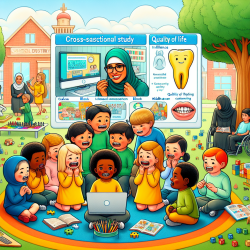Introduction
In the realm of speech-language pathology, the integration of data-driven insights into practice is crucial for achieving optimal outcomes. As practitioners, understanding the broader socio-economic and environmental factors that impact child development can significantly enhance our therapeutic approaches. A recent study titled A Qualitative Inquiry of Food Insecurity in Belize offers profound insights that can be leveraged to improve online therapy services, particularly for children in vulnerable situations.
Understanding the Context: Food Insecurity in Belize
The study conducted in the Cayo District of Belize provides a comprehensive look at the barriers to food access and their implications on food security. It highlights the complex interplay between family composition, income, education, and employment as significant determinants of food access. The findings underscore the necessity for sustained investment in education and public infrastructure to alleviate food insecurity, which is a critical factor influencing child development.
Implications for Online Therapy Services
As practitioners providing online therapy services, understanding the socio-economic backdrop of our clients can inform our therapeutic interventions. Here are several ways the insights from the Belize study can be integrated into practice:
- Holistic Assessment: Incorporate questions about socio-economic factors, such as family composition and education levels, into initial assessments to tailor therapy goals and strategies effectively.
- Resource Connection: Develop a network of local resources, including educational programs and food assistance services, to support families in addressing barriers to food access and education.
- Advocacy and Education: Advocate for policies that support educational access and infrastructure development. Educate families on the importance of nutrition and its impact on cognitive and speech development.
Encouraging Further Research
The study in Belize highlights the critical need for continued research into the socio-economic factors affecting child development. Practitioners are encouraged to engage in or support research initiatives that explore these dimensions further. By doing so, we can contribute to a more comprehensive understanding of the factors influencing child development and enhance the efficacy of our therapeutic interventions.
Conclusion
Incorporating insights from research, such as the study on food insecurity in Belize, into our practice as speech-language pathologists can significantly enhance the outcomes for children. By understanding and addressing the broader socio-economic factors, we can tailor our online therapy services to meet the unique needs of each child, ultimately fostering better developmental outcomes.
To read the original research paper, please follow this link: A qualitative inquiry of food insecurity in Belize.










